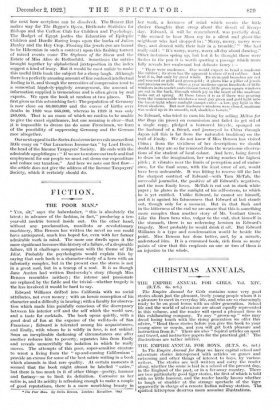FICTION.
THE POOR MAN.*
"YES, sir," says the haberdasher, "this is absolutely the latest ; in advance of the fashion, in fact," producing a ten- year-old necktie turned inside out. On the other hand, without any proclamation, manifesto or revolutionary machinery, Miss Benson has written the novel no one could have anticipated, much less hoped for, even with her former admirable work in mind. The more one dwells upon it the more significant becomes this history of a failure, of a despicable failure, till it challenges comparison with the theme of The Idiot. Probably the psychologists would explain this by saying that each book is a character-study of a hero with an inferiority complex, but in the present case the storm is not in a great soul, but in a teacup of a soul. It is as though Jane Austen had written Dostocvsky's story (though Miss Benson resembles neither) ; the intense and passionate are replaced by the futile and the trivial—whether tragedy is the less involved it would be hard to say.
Edward Williams drifted into California with no social attributes, not even money ; with an heroic conception of his character and a difficulty in hearing ; with a faculty for observa- tion which made him painfully conscious of the discrepancy between his interior self and the self which the world saw, and a taste for cocktails. The book opens quietly, with a good deal of fun at the expense of the well-to-do of San Francisco ; Edward is tolerated among his acquaintances, and Emily, with whom he is wildly in love, is not unkind. Soon an inexplicable darkening of circumstances one after another reduces him to poverty, separates him from Emily and reveals unmercifully the isolation in which he really moves. The attempts of this poor, super-sensitive creature to wrest a living from the "up-and-coming Californians" provide an excuse for some of the best satiric writing in a book which abounds in that rare quality. At certain moments it seemed that the book might almost be labelled "satire," but there is too much in it of other things—poetry, humour and fantasy—so to limit its definition. Corrosive as her satire is, and its acidity is refreshing enough to make a couple of good reputations, there is a more nourishing beauty in
• The Poor Man. By Stella Benson. London: Maemlllan. Ma.]
her work, a keenness of mind which scents the little elusive thoughts that creep about the desert of Every- day. Edward, it will be remembered, was partially deaf. " He seemed to hear Mom say to a silent and ghost-like neighbour who had dropped in : Merry, merry, merry were they, and danced with their hair in a tremble.' " She had really said : " It's worry, worry, worry all day about dancing." Other instances spring up, but lest it be thought these were flashes in the pan it is worth quoting a passage which more fully reveals her exuberant but delicate fancy :— " There were madroncs. One would expect to bend a madronc like rubber ; its stem has the apparent texture of red rubber. And bent it is, but only by great winds. Its stem and branches are red and rose-red or gold and green-gold ; it glows like a pillar of jewels and precious metals. Once a year madrone opens hundreds of little windows in its scarlet and crimson tower, little green square windows are cut in the bark, through which joy in the heart of the madrone looks out at spring. At those times it is as if there was pouring from the innumerable windows a most gay green and gold light into the forest-light where sunlight cannot enter—a low, guy light in the forest shadows. But now madrone's windows were closed, madrone was sealed up in its smooth, red, shadeless towers."
So Edward, who tried to earn his living by selling Milton for Our Boys (in prose) on commission and failed to get rid ol a single copy, pledged a borrowed bicycle, sponged on the husband of a friend, and journeyed to China through Japan (all this is far from the naturalist tradition) on the trail of Emily. We do not know if Miss Benson has visited China ; from the vividness of her descriptions we should doubt it, they are so far removed from the wearisome observa- tions of the student of local colour. And here, being forced to draw on the imagination, her writing reaches the highest pitch ; it vibrates near the limits of perception and of endur- ance, for the final scene, with the least error of art, would have been unbearable. It was fitting to reserve till the last the sharpest contrast of Edward—with Tam MeTab, the successful journalist, the positive of all Edward's negatives, and the man Emily loves. MeTab is cut out in stark white paper ; he glares in the sunlight of his self-esteem, to which he is yet entitled. Unlike Edward, he cannot see himself, and it is against his fatuousness that Edward at last stands out, though only for a moment. But in that flash and in the bitterness of the end we arc aware that this is something more complex than another story of Mr. Verdant Green. Like the Ibsen hero who, vulgar to the end, shot himself in the stomach, there is no redeeming heroism in Edward's tragedy. Most probably he would drink it off. But Edward Williams is a type and condemnation would be beside the point. Miss Benson has done better, and, by a miracle, understood him. It is a crammed book, rich from so many points of view that this emphasis on one or two of them is an injustice to the whole.






































































 Previous page
Previous page